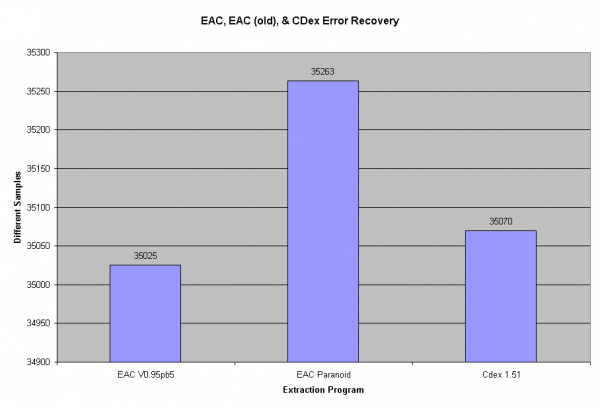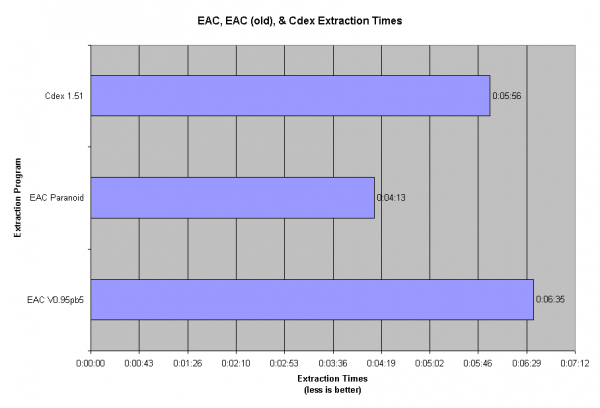EAC Vs CDex SecureMode II: Difference between revisions
No edit summary |
|||
| (7 intermediate revisions by 2 users not shown) | |||
| Line 26: | Line 26: | ||
Track was ripped with each program, I then cleaned the CD & extracted the track with my Lite-on 811s using EAC secure mode & test & copy (achieved a CRC match) which I used as a reference file. I then bit compared each track from each extraction program against the reference file using foobar. | Track was ripped with each program, I then cleaned the CD & extracted the track with my Lite-on 811s using EAC secure mode & test & copy (achieved a CRC match) which I used as a reference file. I then bit compared each track from each extraction program against the reference file using foobar. | ||
==Results== | ==Results== | ||
| Line 69: | Line 56: | ||
[[Category:Comparison of CD ripping techniques]] | |||
Latest revision as of 22:30, 29 July 2010
Introduction
I wanted to test EAC’s secure mode, old secure mode (Paranoid), CDex’s Paranoia implementation at recovering errors to do this with accurate results I first needed to find a drive which 1. Does not jitter & 2. Does not cache (or buffer) audio data because these things make accurate error recovery more complicated & currently CDex does not support drives which cache audio & jitter. My Pioneer 106s was my most suited drive so chose it for the test. Second I needed to find a CD with a track that had unrecoverable errors I chose a pressed CD with light & heavy scratches that I had lying around.. I would later need to clean the CD to create a reference copy of the track.
Conditions
Drive used was a Pioneer 106s DVD-ROM with PIO transfer mode set to disable the drives audio caching
The software & setting I used were,
EAC V0.95pb5
- Secure Mode
- No disable Cache (no correction used)
- Yes Accurate Stream (no correction used)
- No C2
EAC V0.95pb5
- Paranoid mode
- No disable cache
CDex V1.51
- Paranoia, Full
Track was ripped with each program, I then cleaned the CD & extracted the track with my Lite-on 811s using EAC secure mode & test & copy (achieved a CRC match) which I used as a reference file. I then bit compared each track from each extraction program against the reference file using foobar.
Results
Error Reporting Results
Under Construction
Error Recovery Results
EAC was best at recovering errors, CDex was at a close second & EAC's old secure mode (Paranoid) was worst.

EAC's old secure mode (Paranoid) was the fastest, CDex came second & EAC's secure mode last

Conclusion
EAC’s secure mode had the least amount of errors making it best at recovering errors but difference wasn't large between EAC's secure mode & CDex Paranoia, Full. I believe the differences in scores are due to the amount of read-retries the program commands the drive to take.
CDex's Paranoia, Full did very well & the test has shown that when using a supported drive (a drive that doesn't cache audio or jitter) CDex does in fact report not corrected errors & is a good compromise between speed/quality for recovering errors.
EAC's old secure mode (Paranoid) was the fastest & may be helpful for highly damaged CD's because of it's speed but should be avoided if you want accuracy.
